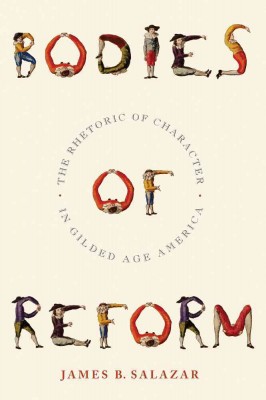| Bodies of Reform: The Rhetoric of Character in Gilded Age America Contributor(s): Salazar, James B. (Author) |
|
 |
ISBN: 0814741312 ISBN-13: 9780814741313 Publisher: New York University Press OUR PRICE: $28.50 Product Type: Paperback - Other Formats Published: September 2010 |
| Additional Information |
| BISAC Categories: - Literary Criticism | American - General - History | United States - 19th Century - History | United States - 20th Century |
| Dewey: 823.809 |
| LCCN: 2010019202 |
| Series: America and the Long 19th Century |
| Physical Information: 0.77" H x 6.08" W x 8.92" (0.95 lbs) 304 pages |
| Themes: - Chronological Period - 19th Century - Chronological Period - 20th Century |
| Descriptions, Reviews, Etc. |
| Publisher Description: Part of the American Literatures Initiative Series From the patricians of the early republic to post-Reconstruction racial scientists, from fin de siècle progressivist social reformers to post-war sociologists, character, that curiously formable yet equally formidable "stuff," has had a long and checkered history giving shape to the American national identity. Bodies of Reform reconceives this pivotal category of nineteenth-century literature and culture by charting the development of the concept of "character" in the fictional genres, social reform movements, and political cultures of the United States from the mid-nineteenth to the early-twentieth century. By reading novelists such as Herman Melville, Mark Twain, Pauline Hopkins, and Charlotte Perkins Gilman alongside a diverse collection of texts concerned with the mission of building character, including child-rearing guides, muscle-building magazines, libel and naturalization law, Scout handbooks, and success manuals, James B. Salazar uncovers how the cultural practices of representing character operated in tandem with the character-building strategies of social reformers. His innovative reading of this archive offers a radical revision of this defining category in U.S. literature and culture, arguing that character was the keystone of a cultural politics of embodiment, a politics that played a critical role in determining-and contesting-the social mobility, political authority, and cultural meaning of the raced and gendered body. |
Contributor Bio(s): Salazar, James B.: - James B. Salazar is Assistant Professor of English at Temple University. |